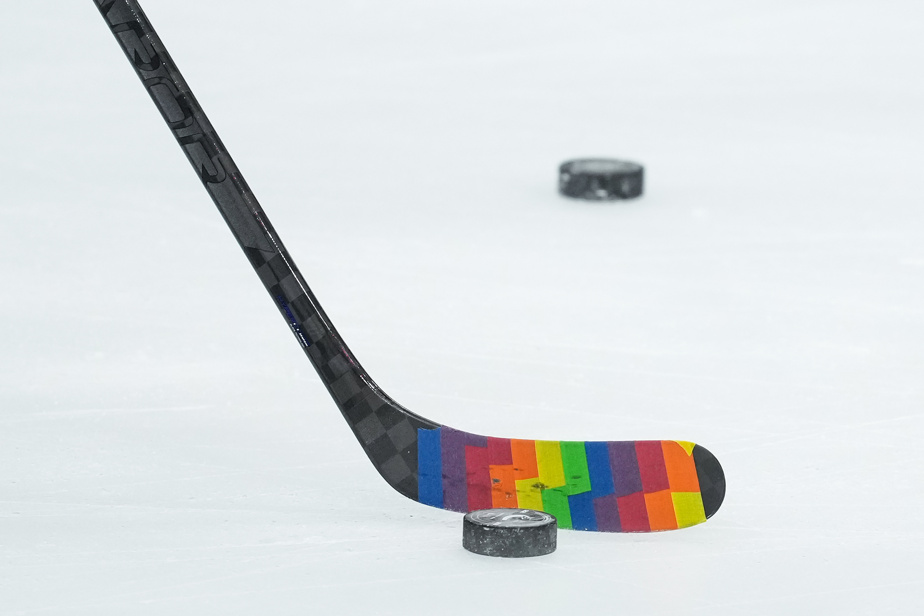The Canadian will become, this Thursday evening, the 32nd and last NHL team to hold its Pride evening this season. In recent months, these displays of solidarity with the LGBTQ community have become a source of controversy for several clubs.
However, this in no way alters the relevance of these events, believes Marie Houzeau, executive director of GRIS-Montréal, a non-profit organization whose mission is to demystify sexual orientations and gender identities.
“It’s very important that organizations that are seen as flagships of our society take a stand for inclusion,” she explains in an interview with La Presse. These are messages that we want to see carried by people who have media visibility. »
“We know very well that public models do pay off,” she adds. The same goes for athletes, politicians or, on a smaller scale, teachers or school principals who come to the defense of their students.
GRIS-Montréal worked with the Habs in designing this year’s programming. Ms. Houzeau expects a smooth evening, although a last-minute change can always happen.
The thorn in the side of several teams since the start of this season has been the wearing of multicolored jerseys during the pre-game warm-up period. These jerseys, specially designed for the event, can then be sold at auction in order to donate funds to charities.
After Ivan Provorov refused to wear the jersey planned by the Philadelphia Flyers last January, the episodes multiplied.
Ilya Lyubushkin (Buffalo), Andrei Kuzmenko (Vancouver), Ilya Samsonov (Toronto), James Reimer (San Jose) and brothers Eric and Marc Staal (Florida) all impersonated Provorov. Some invoked religious reasons. Others, more specifically players of Russian origin, said they feared for their safety.
A law enacted in Russia provides for the prohibition of all “propaganda” on “non-traditional sexual relations”. Obviously, players from this country say they feel threatened. However, it is unclear what real consequences those who engage in this “propaganda” face, or how it is defined.
The New York Rangers, Minnesota Wild, and Chicago Blackhawks, on the other hand, decided outright that no one would wear a multi-colored jersey, even though that element was part of their celebrations.
For Marie Houzeau, this wind of dissension is problematic, because for an organization, sports or not, “it is important to speak with one voice”. Even more so when addressing a young audience.
At the Canadian, a special jersey must be worn before the game, but it is reported that they have not yet surveyed the players on their intentions for Pride evening. We were therefore not in a position, on Tuesday, to advance on the presence or not of refractory within the group.
David Savard, he left no ambiguity. During the Canadian’s visit to Buffalo last week, the defender was asked about it. A few minutes earlier, the Sabers had announced that Ilya Lyubushkin would skip his club’s warm-up period.
On his own behalf, Savard spoke of the importance of “showing that everyone is accepted.”
“It’s an important day for hockey and to show our support for the [LGBTQ] community,” he added. I support this movement. It’s fun doing this for them. »
At that time, the Pride of the Habs evening had not yet been the subject of discussions between the players.
This support that Savard talks about is even more timely, according to Marie Houzeau, of GRIS-Montréal, in light of the change in tone towards the LGBTQ community observed south of the border. And a little to the north too.
In recent months in the United States, public discourse has hardened, especially against trans people. In a recent Bloomberg report, the American Civil Liberties Union calculated that by 2023, at least 385 anti-LGBTQ laws had been filed in various states.
This trend is not confined to the United States, confirms Ms. Houzeau, who says she sees growing “a form of polarization” on our side of the border.
“We see that more and more issues are now seen as a matter of opinion,” she worries. What distinguished Canada and Quebec, until recently, is that when we talked about the LGBTQ community, we were talking about human rights. However, we are witnessing a shift, which we can feel in the speaking out of certain columnists. The very existence or legitimacy of these minorities is questioned. »
